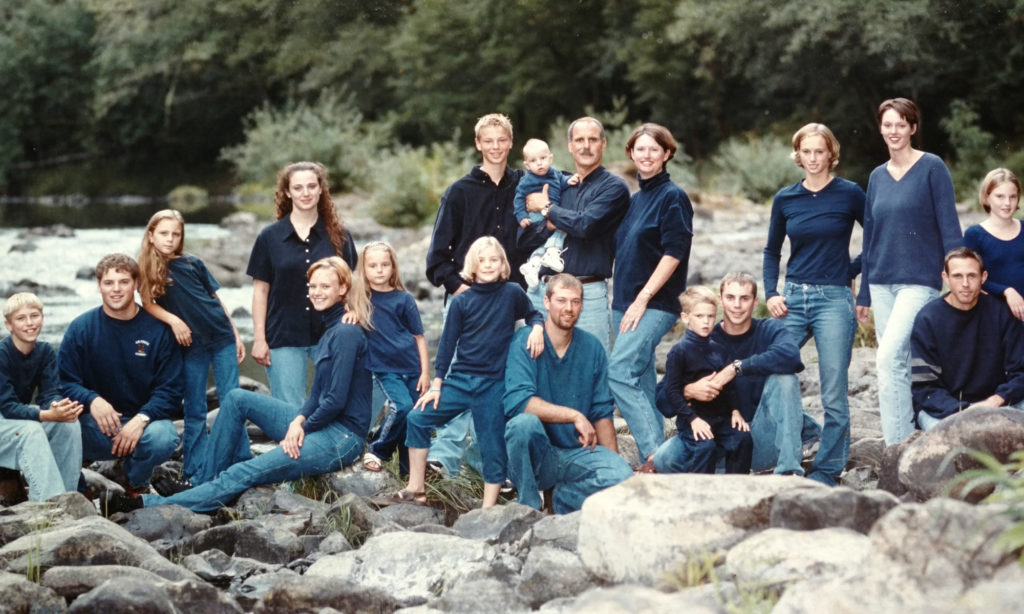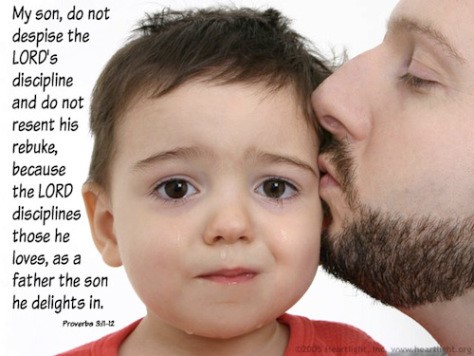Child-rearing!
After our first child, Leslie, was born, and we began to get the hang of nursing, life seemed perfect. That is until Leslie began to get mobile, She began to get into things and the more she did the more unhappy we got. We had been taught in college psychology classes that children were born perfect and that the less we interfered with their explorations, the happier and emotionally healthier our baby would be. We were taught that discipline, especially spanking, was why there are wars and the like. The child-rearing theory we had learned, said children who are hit by their parents are being taught that hitting is OK. So we let Leslie do pretty much whatever she wanted and we tried to give her as much freedom as possible, within reason. There were exceptions, like not letting her play near the wood stove.
As you might imagine, as Leslie began to break things, including my stereo, we became more and more unhappy. Like most parents who use this system of child-rearing, we had to keep putting our valuables higher and higher, so she couldn’t reach them. At the same time, Leslie was becoming more and more of a tyrant. If the Martians had landed near our home and asked us to take them to our leader, we would have taken them to Leslie. Not only were we becoming more unhappy, but so was Leslie. There seemed to be no end to her crying and throwing fits. In the end, she was miserable and so were we!
Child-rearing is not always so easy!

About this same time, my Aunt Bobbie and Uncle Ward were constantly inviting us to their church functions. We always made up lame excuses why we couldn’t go, until they invited us to a class on child-rearing. They really had us on that one; we didn’t want to go to church but we needed help. So we began attending that class and read the book, “Dare to Discipline”, by James Dobson. As we put those principles into practice, a miracle happened; Leslie got happier and happier and so did we.
The main Idea!
The main idea behind Dobson’s book is that children are not born perfect, instead they are born selfish. They don’t know what is best for themselves, so a good parent will train them to do what is right. God’s word says, “he who spares the rod hates his son”, this was becoming more and more true for us. Though we really did love Leslie, we didn’t feel very loving toward her. As we began to obey this Old Testament teaching about physically disciplining her, things changed. Leslie, contrary to what we had previously been taught about child-rearing, became happier, less violent and we began to feel more love for her again. God’s word worked like magic and it has continued to work for all our young children, and for that matter, our grandchildren as well.
Unfortunately, the magic didn’t last!
Now it would be great if that was the final chapter to a beautiful story, where Shary, Leslie and I skipped off into the sunset together as she grew older. That philosophy of child-rearing worked so well that we thought we should use it on Leslie for the rest of her life, wrong! All our children benefited from that system till they were about 12 years old.
People used to compliment us on how well behaved our children were and how much fun they were to be around. But when each of them hit puberty we began to have some serious problems. Friends began to tell me that maybe I should lighten up a little, they even quoted the Bible where it says not to exasperate your children. My response was, “everything exasperates a teenager”. We finally had to come to the conclusion that letting go had to take place sometime and maybe it would be better to let go a little at a time until they left home. This method of child-rearing would gradually prepare them for adulthood instead of totally controlling them right up till they turned 18 and then all of a sudden thrusting them into the world where they made all their own decisions.
Making the change, taking a chance!
I remember when I made the final change in our child-rearing technique, Nathan was pushing to attend the high school dances. I had gotten into trouble at dances and up till this time had told the kids they couldn’t go. What good can possibly take place by putting kids of the opposite sex in a dark room together? Well, Nathan continued to tell me how not going would ruin his life. So I sat him down and told him all the reasons this was a bad idea, then told him he could make up his own mind. I figured I had done a pretty good job making my case, but he didn’t even hesitate, he decided to go.
When Nathan got home he told me all about the dance and how lame it was. If I had held firm it would have become bigger than life. He would have hated me and been convinced that dances were better than they typically are. The most amazing thing that happened is that he talked to us about it afterwards. Before, the kids would not talk to us, there was no walking them through anything because we did not communicate.
We had gradually moved through the three distinct philosophies of child-rearing.
In the last system we actually got all the benefits we were hoping for and more. We really believe it was God’s plan all along. Our children, instead of being our enemies, gradually, as they grew older, became our best friends. Most of our kids are trying to raise their kids using the third philosophy. Below we have illustrated the three philosophies in a way that people can fairly easily wrap their heads around. People often ask us how in the world did we survive rising all those kids, the answer is found in these illustrations.
Three Basic Approaches To Raising Children!
In the following diagrams the lines represent boundaries. Between the lines is the area where children are allowed the freedom to make their own decisions. Outside the lines represents the area a parent does not allow a child freedom, this is the area where parents forbid or try to forbid certain behavior. In example; most parents would allow children to play in their home or their yard, this is inside the boundary lines. Also, most parents would forbid children tp play in the street where they could get run over by a car, that would be something outside the boundary lines.
In this diagram the bottom of the lines represents birth and the top of the lines represents the age a child leaves home and is not under their parent’s authority any longer. This usually means the bottom of the lines start at birth and the top of the lines is about 18 years of age.

Child-rearing Philosophy #1
The above diagram represents modern child psychology’s approach to boundaries. It is based on the belief that children are born perfect, a clean slate if you will. So, the less we restrict children and the fewer judgments of right and wrong we place on them, the happier and more whole they will be. This philosophy believes children should be free to do whatever they want as long it does not put them in danger. Again, the idea is that they are born perfect and we mess them up. The proponents of this approach site psychological research to prove that corporal punishment is the cause of all kinds of problems for children and society at large.
Parents with this philosophy usually let their young children do whatever they want when they are young, but begin to put more and more restrictions on them as they get older.
It usually goes something like this; it’s OK for Johnny to kick or hit mommy when Johnny is little, but as Johnny gets older, mom and dad believe he should stop that behavior. It is OK to throw temper tantrums when you are young, but as you get older that is not socially acceptable. It is cute to be selfish when you are young but is discouraged as you get older.
Parents who are fully devoted to this philosophy will make the boundaries tighter and tighter until their child leaves home. Most of these children end up hating their parents because the rules keep changing, and they are in trouble more and more as they get older. They seem to be in constant conflict with their parents. Most of these kids can’t wait to leave home, and have very strained relationships with their parents. They feel they are never good enough for their parents. Some people have noticed the diagram looks a little like a volcano and that is pretty much what we create with this philosophy.
Kip Kinkel
I have a family member that lived a few houses down from Kip Kinkel, the mass murderer. He was the high school student that shot both his parents and then went into Springfield, Oregon’s Thurston High school, killing 2 students and wounded 25 others. [1] Thier kids played with Kip as he was growing up and knew his family. Kip’s parents where fully devoted to the modern psychological approach to raising kids. Kip is the extreme result of that philosophy. Fortunately, most people do not apply that philosophy fully; most people’s philosophy has some of the next two mixed in.

This psychology has never worked, as indicated by the wildly famous Norman Rockwell drawing of a mother abandoning what she learned from a child psychology book. New research has proven that many of the studies done by the child psychologists were not rooted in scientific procedure. These psychologists made things up in order to push their theories. these theories have been taught in our colleges, as fact, for many years.[3] The problem is so widespread that it has been called the psychology research crisis.[4] The cheating is so prevalent that over half of psychological studies have been found to be bogus. Some Harvard researchers are looking for ways to detect fake studies without having to do the research all over again. [2]
Child-rearing Philosophy #2
The strict moral approach to boundaries looks something like this. From birth to 18 the parents call all the shots. The parents made a lot of mistakes in life and want to protect their children from making those same mistakes. So, their children have very little freedom. These parents decided what is right and wrong, what is good and what is bad. They then impose these boundaries on their kids, hoping the children will turn out to be far better, less damaged, individuals than their parents. These parents decide what they should eat and not eat, how they should and should not dress, who their friends will be and how they will wear their hair. They regularly tell their children what is right and wrong and they discipline their children when they get out of line.
Shary and I applied this approach to child-rearing on our oldest daughter after we abandoned the first philosophy. We only let her hang out with other children who were being raised the same way. In the beginning this approach works great. Unfortunately the final outcome of this approach was similar to the first approach, in that, these kids could not wait to get out from under our control. When our daughter Leslie was grown and raising her own children, she told us that she lied all the time and so did all her other friends who were raised this way. They knew we would not approve of a lot of what they did, so they just lied and were sneaky, pretending to love and follow our rules.
We have apologized to our children for treating them this way and they have been gracious enough to forgive us.
Our relationships with our children have greatly improved since we abandoned this philosophy. OK we are slow learners, it is good that we had 12 more kids to practice on. We have never been perfect parents, but as we followed God’s advice more closely we have become happier parents and our kids have become happier as well.
How bad was it?
To give you a little example of how bad it got under the strict moral approach, here is one of our stories. Our oldest daughter, Leslie disliked us so much as a teenager, that she would not eat dinner with us. When we invited her fiancé to the house for dinner for the first time, we thought she would certainly break with her avoidance of us and join the meal.
He showed up and we all sat down to eat and Leslie did not come. Her fiancé, David, asked where she was, we explained the situation, telling him we mistakenly thought she would join us for dinner, since he was there. He said that was silly, so he went to her room to talk her into coming to dinner. Evidently, it wasn’t that simple. He had to physically drag her down the stairs and put her in the chair, it was quite a sight. She does not remember it, but we were all highly amused. Our kids do not remember a lot of things they did and said to us when they were in their teens. God has a way of removing the past, isn’t that great?

Child-rearing Philosophy #3
What we now believe to be God’s approach to boundaries. This approach suggest that we are fairly strict when children are young but slowly loosen up on the boundaries as they get older. It is based on two scriptures.
- Proverbs 22:15
Foolishness is bound up in the heart of a child; The rod of correction will drive it far from him.
- Colossians 3:21
Fathers, do not exasperate your children, so they won’t become discouraged.
The Bible teaches that we are all sinners, that we were born selfish. Selfishness and all sin is harmful to us as well as others. I still remember the speech my dad used to give me before he spanked me. He would say something like this, “Chris, I love you, but I can’t allow you to act this way. If you keep treating people like this you won’t have any friends and people won’t like you. I know you don’t understand this but this hurts me more than it does you”. At this point I always thought he had lost his mind, since I could not see any way that it hurt him more than my bottom was going to hurt. Now as a parent, I get it. No one enjoys disciplining their children.

Hebrews 12:5-7a, 10b-11 says…
“Have you forgotten that word of encouragement that addresses you as sons: “My son, do not make light of the Lord’s discipline, and do not lose heart when he rebukes you, because the Lord disciplines those he loves. And he punishes everyone he accepts as a son. Endure hardship as discipline…. but God disciplines us for our good, that we may share in his holiness. No discipline seems pleasant at the time, but painful. Later on however, it produces a harvest of righteousness and peace for those who have been trained by it.

If you believe God knows best, join us and the Wellness Gospel team; register for our weekly newsletter, then spread the word by sharing this with your friends on social media and may God bless you richly.
If you want to keep improving your health, and enjoy this kind of biblical scientific information, then I would like to recommend three must-read books;
- “God’s Guide to Biblical Health and Healing” by Rev. Chris and Shary Schauermann http://tinyurl.com/zvkbfau
- “Let’s Play Doctor” by Dr. Joel Wallach http://tinyurl.com/j8ybt8r
- “None of These Diseases” by S.I. McMillen, M.D. and David E. Stern, M. D. http://tinyurl.com/hh7ezs2
You can get all these books at Amazon.com or simply click on the URL under each book title.
References
- Kip Kinkel https://en.wikipedia.org/wiki/Thurston_High_School_shooting
- Lying about research http://news.stanford.edu/2015/11/16/fraud-science-papers-111615/
- Lying about research http://www.smithsonianmag.com/science-nature/scientists-replicated-100-psychology-studies-and-fewer-half-got-same-results-180956426/
- Psychology research crisis https://en.wikipedia.org/wiki/Replication_crisis


